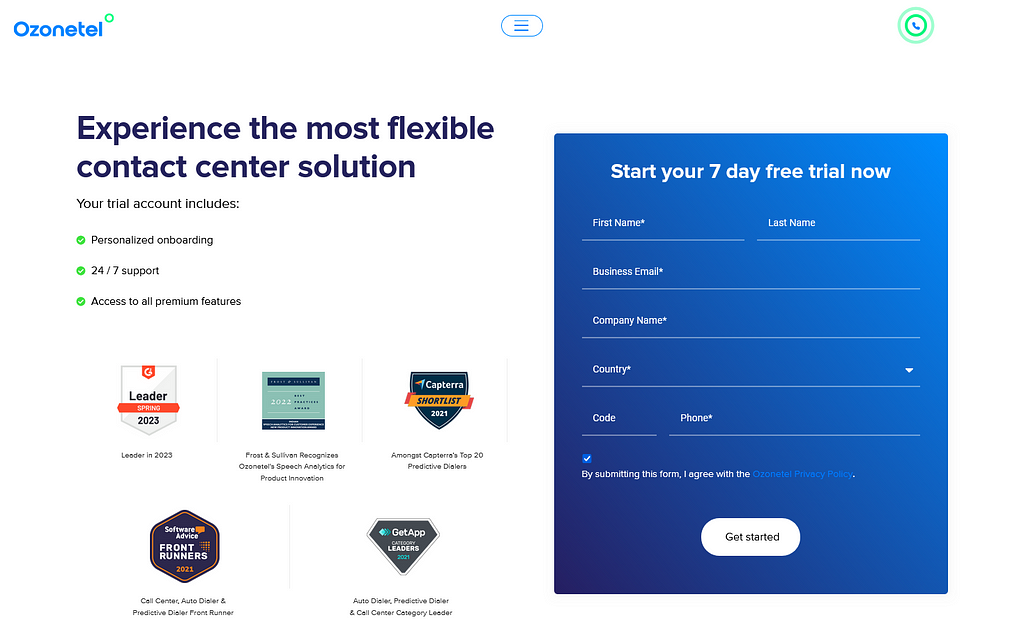- Resources
- ‘Technology a great enabler but human role indispensable’
‘Technology a great enabler but human role indispensable’

“For a logistics firm to thrive, technology and human support must go hand-in-hand. While technology is a big enabler, I can’t stress enough the importance of timely human intervention,” according to Manu George, director of operational excellence at CABT Logistics. The Gurugram-based startup is among India’s fastest growing intracity logistics networks with a presence in more than twenty states.
Sharing his views on the new age technology, Manu said every firm prioritizes on delivering a seamless customer experience and Conversational AI can help enterprises identify customer needs and generate actionable insights. Below is the edited excerpt of the interview:
In this article, we will explore:
- 1. Since your company is into B2B and B2C space, please tell us how CABT logistics has leveraged emerging technologies to improve customer experiences?
- 2. Please tell us about the AI tools you employed before the pandemic to engage with the customer and what has changed since the pandemic.
- 3. So, based on your experiences, do you think logistics space can benefit from Conversational AI?
- 4. As we know, Logistics in India is not only unorganized but also a vastly complex industry. What, according to you, are the biggest gaps in the sector that require immediate attention?
- 5. In a post covid world, customers are seeking services that are proactive and individualized; they are looking for instant gratification. What, according to you, are the major challenges to achieving personalization at scale and how Conversational AI can help.
- 6. Besides customer support and engagement, what other tasks an AI-empowered chatbot can perform in an organization?
- 7. Over the last few years, we have seen the advent of scores of tech-driven start-ups in the logistics and online transport space. So, how do you see the sector evolving in coming years and what role new-age technology would play in its transformation?
Since your company is into B2B and B2C space, please tell us how CABT logistics has leveraged emerging technologies to improve customer experiences?
We have a CABT partner app where all our riders are registered. I would not say it’s completely Conversational AI but our platform has a database with all the relevant information from the time a rider gets enrolled into the system till the time we make payouts. If they need any support, they can directly get in touch with us or chat with our agents. So, it is developed to address their concerns and also to ensure that we keep track of their progress.
We also have logic cards (web design) where we have stored our client data with riders mapped to respective clients in respective cities. So we have a complete big database there. We are also planning something similar, wherein we can get real-time updates on rider concerns or anything that is not happening right on the ground.
Please tell us about the AI tools you employed before the pandemic to engage with the customer and what has changed since the pandemic.
Before the pandemic, we had not zeroed in on a specific tool, we were trying out different things. But once the pandemic came in, that is when we understood that we need to develop this as fast as possible. Covid taught us several lessons; what could go wrong or how things can come to a standstill.
Despite all odds, our company grew threefold during this period. We were working tirelessly to ensure that nothing goes wrong on the ground without being on the ground. We developed multiple features that helped us be in constant touch with our riders. We came up with training videos and several other interactive features. So, the pandemic taught us to be more focused on new-age technology and it has benefited our partners as well as clients.
So, based on your experiences, do you think logistics space can benefit from Conversational AI?
There are two sides to it. If you talk about our clients, they are process driven and organized but that’s not entirely the case with our riders. It’s not easy for them to understand the nitty-gritty of tech-related things, so human support becomes equally important. So, I would say, going hybrid is the best way forward.
AI helps us monitor the cargo movement and give us real-time updates on all the key developments on the ground. AI is a big enabler but technology and ground support must go hand-in-hand. There are several customer-centric AI features which we have still not implemented because we want to see how it runs and we want to take larger feedback before we go for any standardization.
As we know, Logistics in India is not only unorganized but also a vastly complex industry. What, according to you, are the biggest gaps in the sector that require immediate attention?
In terms of challenges, I believe the efforts put in by partners should be recognized more often and they should be rewarded based on their performances. A lot of people who come into logistics don’t stick around for a long time. Of course, it’s stressful work, we operate 24 * 7. What happens is that if there are many partners in an organization, they often feel left out or disengaged. At times, they are not aware of how well they are performing or growing. We need to value people who are doing good work. You cannot solely run after profits, you will have to also understand that every stakeholder in the business matters. We should support them to scale up their career and give commensurate rewards. This is a major gap in our space and it needs to be addressed.
In a post covid world, customers are seeking services that are proactive and individualized; they are looking for instant gratification. What, according to you, are the major challenges to achieving personalization at scale and how Conversational AI can help.
Delivering a seamless customer experience is a must for every firm and Conversational AI can help us understand customer preferences. The AI tool can give us an insight into the current buying trends and the behavioral choices of customers. We are using AI to give suggestions based on customers’ preferences. Our endeavor is to suggest the right product with better quality and cost-effectiveness. So, customers spend less time and get faster resolution. So, that’s what we are trying to achieve and we have a complete customer-centric approach. Also, if my customer wants a particular product or a type of service delivered at a specific location or time, we should have the insight and the logistics support to process the request at the earliest.
If we speak about challenges to providing individualized service, there are so many categorizations. Every customer has his own set of expectations and we do receive lots of feedback. So, it is very dynamic and given our pan-India presence it’s nearly impossible to club everything together or to factor in every suggestion.
Besides customer support and engagement, what other tasks an AI-empowered chatbot can perform in an organization?
Besides customer support, AI can help us monitor employee performance. We can also run social campaigns or use this tool to share critical development in the region where our team is deployed. Simultaneously, we can also keep the customer abreast about it. It may not always be useful but it can be informative. So, If we club all these things together, it can go from information to communication to creating a better customer experience.
Over the last few years, we have seen the advent of scores of tech-driven start-ups in the logistics and online transport space. So, how do you see the sector evolving in coming years and what role new-age technology would play in its transformation?
Emerging technology has become indispensable. Logistics platforms can’t function without them. For new players, I would suggest they should start with having a basic technology platform which a customer can easily understand and be able to use. The technology must have a good track record of ensuring accuracy in billings, invoices and payouts for riders. Every logistics firm that is coming in, usually has a strong presence on the ground but if they are not tech-enabled, the going will be difficult for them. And if they want to scale up, you cannot move without technology. I have seen a lot of logistic firms coming in, deploying huge manpower but still failing. Where did they go wrong? It was due to the missing link between technology and ground support. I have seen firms more inclined towards analysis reports and technology enabling but failing because of inadequate human support. Logistics could not be solely tech-driven. Despite having a fantastic central team and tech support, these firms didn’t survive.
Ready to take control of your call transfer
experience for better CX outcomes?
Rakesh Kr Jha
Rakesh, a senior writer at Ozonetel, draws on his decade-long journalism career to write about techn...







